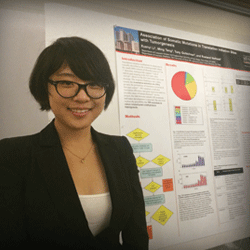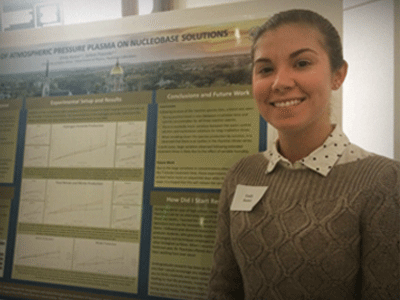

Recently, science students gathered at the Jordan Hall of Science for the annual Fall Undergraduate Research Fair on October 29 to learn about getting involved in undergraduate research at Notre Dame, around the country, and around the world. The fair began with an information session on undergraduate research opportunities in chemistry, followed by student poster presentations and another information session on internships.
At Notre Dame, there are structured internships as well as unique, individualized opportunities. “Specifically, there is the First Year Research Ignition Fellowship, COS-SURF, the Da Vinci Grant Program, the Naughton Fellowship, NURF, NSF-REU, and UNDERC.
“The main reason that students choose to pursue research is because they want to make a change,” said senior biological sciences major Joe Muller.
Research gives students a chance to reinforce what is learned in class. It offers professional development as well as professional growth. Students can expect the following in research opportunities: 8-12 weeks in duration, 35-60+ hours per week in the lab, mentoring directed by a staff scientist, post-doc, or graduate student, developing and carrying out their own research project, reading primary literature, writing lab reports, and presenting a poster/talk, and attending outside seminars.
As for national structured internships, the Mote Marine Laboratory is an example of an organization that offers a number of fully funded opportunities that serve as preparatory and recruitment for a graduate program. These types of opportunities are heavily structured with seminars, journal clubs, and career development workshops, and these programs are highly competitive.
By February 15, 2014, Muller applied to five different programs and was accepted into an NSF-REU at Mote Marine. No formal research experience was required, and the program was intensive with at least 40 hours per week working on research seeking to discover an antibiotic compound. He also presented his research at a poster session at FURF last year. Later, he then returned on a Glynn Family Honors Program grant.
Students are encouraged to start researching programs in November. General applications usually require a personal statement, curriculum vitae, and 2-3 letters of recommendation.
In December, students should begin to write personal statements, fill out applications, and request letters of recommendation. In January and February, students should apply as early as possible when all the materials are ready.
During the fair students also presented posters about their summer research in the Jordan Hall of Science Galleria. Abstracts of the presentations are available on the college website. In addition to the poster presentations, several institutions, organizations, and centers were also in attendance to provide advice and answer questions about research opportunities.
For more information about undergraduate research in the College of Science, including available on-campus and off-campus research opportunities, visit the undergraduate research section College of Science website.